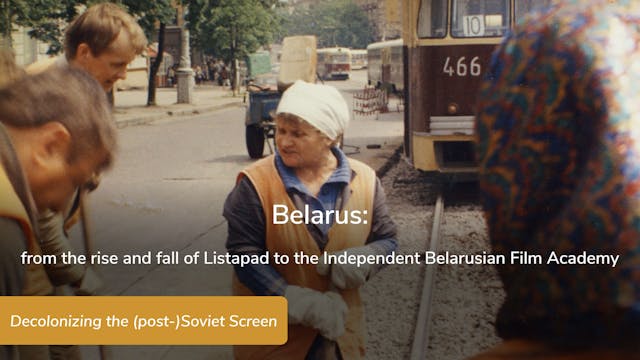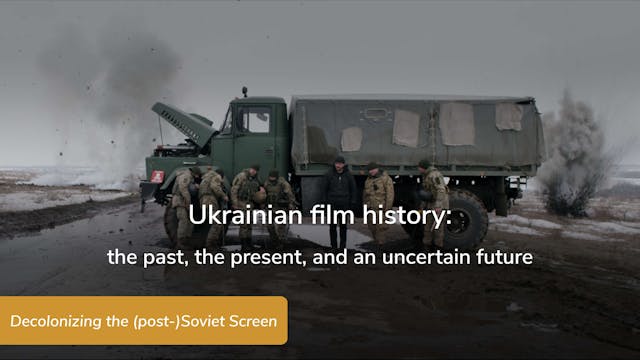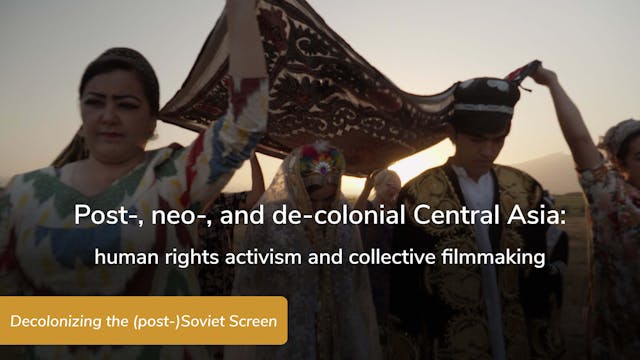Re-assessing the Soviet legacy: canon, censorship, heritage, and archives
Symposium: Decolonizing the (Post-)Soviet Screen
•
1h 27m
Re-assessing the Soviet legacy: canon, censorship, heritage, and archives
SPEAKERS: Dita Rietuma, Melikset Karapetyan, Ivan Kozlenko
MODERATOR: Barbara Wurm
This panel aims to critically approach and reassess Soviet film heritage: its canon, its classics, and its legacy after the collapse of the USSR. Key points discussed by Barbara Wurm, Dita Rietuma, Melikset Karapetyan, and Ivan Kozlenko include: language, censorship, and production policies, the legal and practical ownership of Soviet films (and film prints) made in the former republics, now independent nation states, as well as their role in their respective national film histories and collective memory.
ABOUT THE SPEAKERS:
Dita Rietuma is a researcher for the Latvian Academy of Culture, where she has been involved in numerous studies of the film industry and regularly publishes articles about contemporary film processes in the press. In addition, she is an assistant professor at Riga Stradiņš University as well as the director of the National Film Centre, an institution responsible for supporting the Latvian film industry.
Melikset Karapetyan is an Armenian producer, commissioner, and programmer. In 2002, he founded Art-Film LLC, and has been actively committed ever since to arthouse programming in his native Yerevan. He has also initiated a campaign for the preservation and restoration of Armenian silent films, which is still active today. Since 2018, he has managed the team of the Golden Apricot Pro Industry Development Platform for the Lesser Caucasus region. Since 2019, he has been a film commissioner for the National Cinema Center of Armenia.
Ivan Kozlenko is a film scholar and cultural manager, as well as the founder of the Mute Nights Festival (2010–2022) in Odesa. As the former director of Ukraine’s largest film archive – the Oleksandr Dovzhenko National Center in Kyiv – during his 10-year tenure he succeeded in transforming the former film developing factory into a flourishing cultural centre offering a wide range of film, theatre, and educational programming. In addition, he headed the national film restoration program until 2014 and brought about screenings revisiting restored Ukrainian films at national and international film festivals.
ABOUT THE MODERATOR:
Barbara Wurm is a cultural researcher, author, curator, and film critic, originally from Vienna. Since 2011, she has been a research associate in the section for East Slavic Literatures and Cultures at Berlin’s Humboldt University. In addition, she programmes for a variety of film festivals, including the Berlinale, where she has been chosen to take over direction of the Forum section starting in August 2023. She has published widely on the topic of post-Soviet film, as well as on the work of filmmaker Dziga Vertov.
Up Next in Symposium: Decolonizing the (Post-)Soviet Screen
-
Belarus: Listapad and the Independent...
Belarus: from the rise and fall of Listapad to the Independent Belarusian Film Academy
SPEAKERS: Igor Soukmanov, Aliaksei Paluyan, Andrei Kutsila
MODERATOR: Barbara WurmThrough discussion of the Listapad Festival and the Independent Belarusian Film Academy, this panel gives insight in...
-
Ukrainian film history: the past, the...
Ukrainian film history: the past, the present, and an uncertain future
SPEAKERS: Daria Badlor, Ivan Kozlenko, Yuliia Kovalenko
MODERATOR: Barbara WurmDaria Badior, Yuliia Kovalenko, and Ivan Kozlenko discuss the role and state of Ukrainian cinema in the midst of the Russian invasion, ...
-
Post-, Neo-, and De-colonial Central ...
PLEASE NOTE: This video features a Russian dub for approximately one minute – please turn on English subtitles if needed
Post-, Neo-, and De-colonial Central Asia: human rights activism and collective filmmaking
SPEAKERS: Aïda Adilbek, Mikhail Borodin, Gulzat Egemberdieva, Anisa Sabir...



